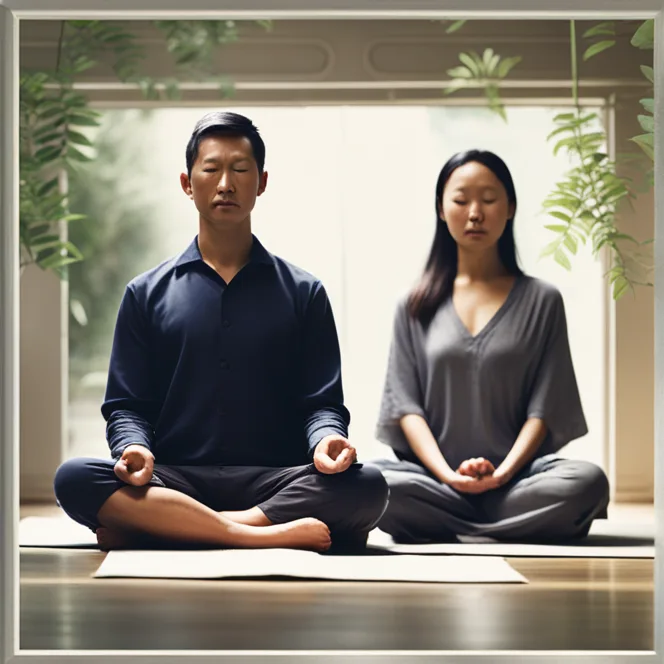
The Nexus Of Meditation & Cognitive Flexibility
Delve into the synergy between mindfulness meditation and enhanced cognitive flexibility, providing insights for a harmonious mind.
article by Hina Kurosawa
Introduction to Mindfulness
The practice of mindfulness is a powerful tool that anchors us in the present moment, encouraging a heightened awareness of our thoughts, emotions, and surroundings. This ancient technique, rooted in Buddhist traditions and adapted in various forms across cultures, is now widely recognized for its benefits in mental health and well-being. Engaging in mindfulness meditation involves focusing one's attention on the here and now, often through the observance of breath, which serves as a pivot for returning to the present whenever the mind wanders. Through consistent practice, mindfulness trains the brain to notice and let go of distractions, fostering a state of serene attentiveness.

Cognitive Flexibility Explained
Cognitive flexibility refers to the mental ability to switch between thinking about two different concepts or to think about multiple concepts simultaneously. This mental elasticity enables individuals to adapt their thinking to new, evolving, or unexpected events— a crucial skill in our ever-changing world. Cognitive flexibility includes aspects like adapting to new information, thinking about multiple ideas, and shifting perspectives, and can play a significant role in our problem-solving abilities, learning, and overall mental resilience.

Mindfulness as a Cognitive Enhancer
Mindfulness meditation has been shown to foster cognitive flexibility. By practicing awareness and acceptance of the present moment, mindfulness allows us to observe our thoughts without judgment. This non-reactive observation creates a mental space between stimulus and response, providing room for more adaptive decision-making. Regular meditators often report improved focus, better memory retention, and more nimble thought processes—traits indicative of cognitive flexibility. As we enter 2024, these qualities are more valuable than ever in navigating the complexities of contemporary life.

Astrological Insights for Focus
Astrology offers a unique lens through which to understand our predispositions and potentials. In the year 2024, expansive Jupiter's dance with innovative Uranus can inspire us to embrace mindfulness as a tool for cognitive development. The stars suggest a period where transformative thought patterns are highly favored. Individuals might find that their meditative practices are particularly potent during this time, with an increased capacity for mental adaptability aligning with the astrological climate.

Horoscopes and Mindful Practices
Horoscopes can serve as a personalized guide for integrating mindfulness into our daily routine. For example, an Aries seeking to improve cognitive nimbleness in 2024 may find that morning meditations help harness the fiery energy of Mars to fuel focused intention for the day. A Gemini could utilize the dual nature of their sign to engage in mindfulness practices that encourage balancing their innate versatility with peaceful grounding. Tailoring mindfulness techniques to individual astrological profiles can enhance the journey toward cognitive flexibility.
Biorhythms and Mindful Cycles
The concept of biorhythms suggests that our lives move in cycles, impacting our physical, emotional, and intellectual states. Pairing mindfulness with an understanding of one's personal biorhythm charts can lead to deeper cognitive flexibility. By meditating during times when the intellectual cycle is at a peak, for instance, one may find that their thinking becomes clearer and more adaptable. Acknowledging the ebb and flow of our natural cycles can help us better navigate the mental demands of our daily lives.
Compatibility and Collective Flexibility
In any relationship, compatibility is influenced by mutual understanding and the capacity to adapt to one another's needs. Mindfulness can enhance cognitive flexibility not only on an individual level but within the dynamics of a partnership as well. Couples who meditate together, or support each other's meditative practices, often find that they are better equipped to tackle conflicts with a calm, flexible approach. This can lead to deeper bonds and a more harmonious coexistence.
Published: 12/14/2023
Modified: 12/14/2023
More predictions
Come back here soon to learn more about yourself and your future


Guide To Mindful Meditation
Learn the simple steps to practicing mindful meditation for inner peace and clarity.


Embracing Stillness: Mindfulness Retreats
Explore the transformative experience of mindfulness retreats, where inner peace meets spiritual growth.


Mastering Meditation Techniques
Discover simple, effective meditation techniques to foster mindfulness, clarity, and spiritual well-being.